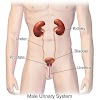Kidney stones symptoms and treatment
Kidney stones
Some stone acids flourish in urine, others alkaline. Medications and special diets, such as the acid ash diet, can help maintain the desired balance and prevent stone formation in the future. There are other medical measures that a doctor can do with his specialized knowledge of the patient's body chemistry and physical condition. It is of immediate importance to remove stones that are causing serious discomfort, and this usually requires surgery. Sometimes it is desirable to remove the entire kidney, if its function is clearly impaired by a large stone or stones, and if the remaining kidney is healthy and capable enough to continue laboring which can cause any Should be shouldered. Naturally, it is more desirable for a person who is susceptible to collaborating with X-rays and other remedies, in regular checkups with their doctor, to form a stone, which can relieve trouble from progress Is and makes every effort to make possible the surgical removal of the event. kidney.
Symptoms of kidney stones
Some stones have no symptoms, at least for a long time. Fine crystals, no larger than sand grains, can travel to the ureter and to the outside world without being aware of the patient. Some "silent" stones are too large to enter or obstruct the ureter, but they can seep into the kidneys and soothe delicate tissues. Some stones can practically fill the renal pelvis and take the irregular shape of the cavity like a cast. They are called "stag horns", such as stones from their antlers. The person who experiences it. The yearning is caused by a stone that enters the ureter and works its way down. The pain is not necessarily felt in the mid-back, by the old-time advertisements for the renal nostril to the memorial area, but can be referred to the pelvic region. In fact, the pain is usually not excruciating, and the immediate symptoms may be nausea, vomiting, chills, and fever.
Treatment of kidney stones
If the stone gets stuck in the ureter, and medical measures can do little more than reduce pain, surgery will be necessary to remove an obstruction, which can push the urine back up, away, and most of all. Can seriously injure the path above it. Kidney-suffering kidneys are generally more prone to infection; Modern antibacterial drugs afford powerful measures of control.
Often a stone passes into the bladder and acute pain is reduced. Bladder stones are relatively easy to remove in devices that leave no operative scar. The surgical instrument is inserted through the urethra, the stone is held and crushed, and the particles are withdrawn. Occasionally, a stone will seep into the urethra and block urine. Its removal is comparatively easy and always gives relief to the patient.








